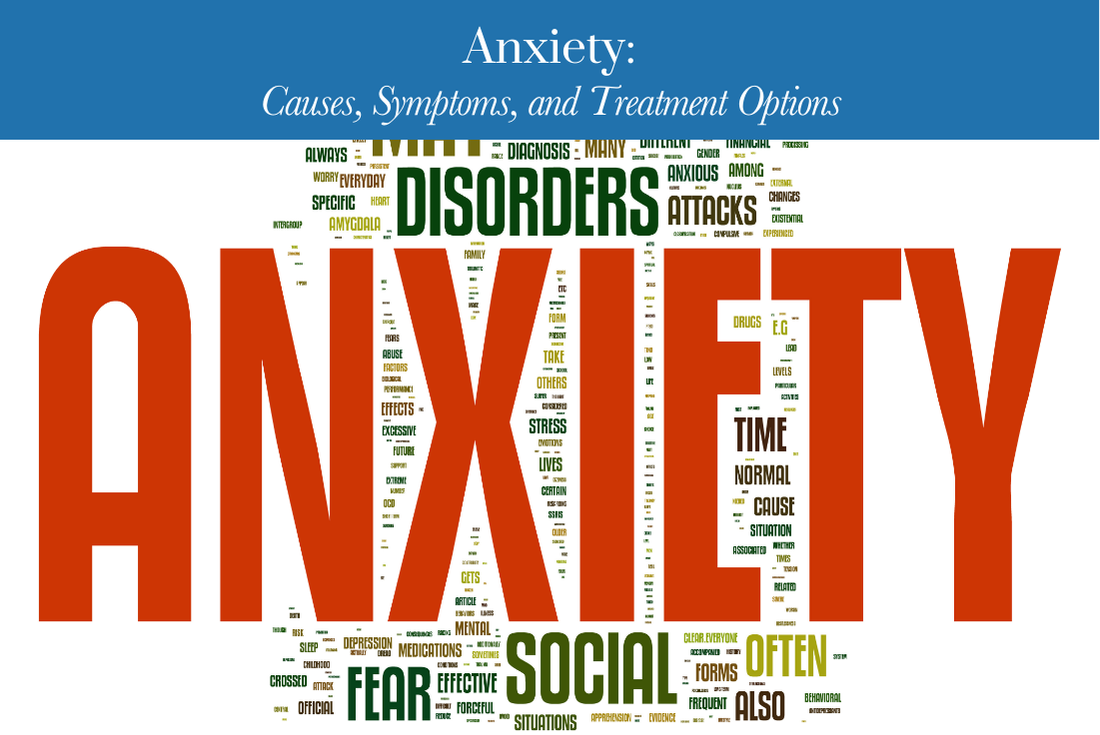
Dr. Matthew Goldenberg, D.O., specializes in the diagnosis and treatment of anxiety disorders, helping patients regain control of their mental health and overall well-being.
What is Anxiety?
Anxiety is the body’s natural response to stress, fear, or uncertainty. It is a normal emotion that everyone experiences at times, and can be useful when we need to react to environmental challenges. However, when anxiety becomes excessive, prolonged, and/or disrupts daily functioning, it may be classified as an anxiety disorder.
Common anxiety disorders include:
- Generalized Anxiety Disorder (GAD) – Persistent, excessive worry about everyday life events.
- Panic Disorder – Sudden episodes of intense fear accompanied by physical symptoms like chest pain, shortness of breath, or dizziness.
- Social Anxiety Disorder – Fear of social interactions and being judged by others.
- Obsessive-Compulsive Disorder (OCD) – Repetitive, intrusive thoughts (obsessions) and behaviors (compulsions).
- Post-Traumatic Stress Disorder (PTSD) – Anxiety triggered by a traumatic event.
- Phobias – Intense fear of specific objects or situations, such as flying, heights, or enclosed spaces.
Symptoms of Anxiety
Anxiety manifests in different ways, affecting both the mind and body. Common symptoms include:
Psychological Symptoms:
- Excessive worry or fear
- Restlessness or feeling on edge
- Difficulty concentrating
- Irritability
- Racing thoughts
Physical Symptoms:
- Rapid heartbeat or palpitations
- Shortness of breath
- Sweating
- Fatigue
- Muscle tension
- Sleep disturbances (insomnia or frequent waking up)
If you experience persistent symptoms that interfere with your daily life, seeking professional support can significantly improve your quality of life and enhance your ability to reach your full potential.
Causes of Anxiety
Anxiety is caused by a combination of genetic, environmental, and psychological factors. Common causes include:
-
- Brain Chemistry – Imbalances in neurotransmitters like serotonin and dopamine.
- Genetics – A family history of anxiety disorders increases the risk.
- Stressful Life Events – Traumatic experiences, major life changes, or chronic stress.
- Medical Conditions – Certain medical issues, such as thyroid disorders or heart disease, can contribute to anxiety.
- Medications: Some prescription medications, such as steroids, stimulants and some asthma medications can increase symptoms of anxiety.
- Substance Use – Alcohol, caffeine, and drug use can exacerbate anxiety symptoms.
Treatment Options for Anxiety
Effective treatments are available to manage and reduce anxiety symptoms. Dr. Matthew Goldenberg, D.O., provides personalized treatment plans tailored to each patient’s needs.
1. Therapy and Counseling
- Cognitive-Behavioral Therapy (CBT): Helps patients identify and challenge negative thought patterns and develop coping strategies.
- Exposure Therapy: Used for phobias and PTSD, gradually exposing patients to fear triggers in a controlled setting.
- Mindfulness-Based Therapy: Teaches techniques like meditation and deep breathing to reduce stress.
2. Medication
- Selective Serotonin Reuptake Inhibitors (SSRIs): Common antidepressants like fluoxetine and sertraline.
- Benzodiazepines: Used for short-term relief of severe anxiety (e.g., alprazolam, lorazepam).
- Beta-Blockers: Helps control physical symptoms such as rapid heartbeat.
- Buspirone: An anti-anxiety medication that has fewer sedative effects.
3. Lifestyle Changes
- Regular physical activity
- Healthy diet and hydration
- Adequate sleep
- Stress management techniques like yoga, deep breathing, or journaling
Comprehensive Q&A Section
Q1: How do I know if my anxiety is severe enough to seek treatment?
If your anxiety is persistent, affects daily activities, or leads to avoidance of work, social situations, or responsibilities, seeking professional help is recommended.
Q2: Can anxiety be cured?
Anxiety is a manageable condition. While some people experience complete relief, others may need long-term strategies to keep symptoms under control.
Q3: How long does it take for anxiety treatment to work?
The effectiveness of treatment varies. Therapy can take a few weeks to months, while medications may take 4-6 weeks to show results.
Q4: Are medications the only option for anxiety treatment?
No, therapy, lifestyle changes, and holistic approaches can be effective in managing anxiety. Medications are an option but not always necessary. In many cases a combination of medication and non-medication treatments in combination lead to the best outcomes.
Q5: Can anxiety cause physical symptoms?
Yes, anxiety often causes symptoms such as headaches, nausea, dizziness, muscle tension, and heart palpitations.
Q6: What are some quick ways to reduce anxiety?
- Deep breathing exercises
- Progressive muscle relaxation
- Listening to calming music
- Engaging in physical activity
Q7: Can diet affect anxiety levels?
Yes, consuming too much caffeine, sugar, and processed foods can contribute to anxiety, while a balanced diet rich in whole foods can improve mental health.
Q8: Does exercise help with anxiety?
Yes, regular exercise releases endorphins, which can help reduce anxiety and improve mood.
Get Help Today
If you or a loved one is struggling with anxiety, know that help is available. Dr. Matthew Goldenberg, D.O., is dedicated to providing compassionate and comprehensive mental health care.
Dr. Goldeberg is licensed to see patients in California, Hawaii and Alaska.
📞 Phone: (424) 276-0777
🕒 Business Hours:
- Monday – Friday: 8:30 AM – 5:00 PM
- Saturday & Sunday: Closed
Contact our office today to schedule a consultation and take the first step toward better mental health.
Final Thoughts
Anxiety is a common but treatable condition. With the right support, therapy, lifestyle adjustments, and possibly medication, individuals can lead a more balanced and fulfilling life. If you are experiencing anxiety symptoms, do not hesitate to reach out for professional help.
Dr. Matthew Goldenberg, D.O. is here to support you on your journey to mental wellness.